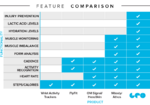Mike leroy
Active Member
I do not know what to make of EMG. I am constantly sore. If wearable tech actually prevents injury and soreness, I would buy it.
After watching some videos, I realize the world is changing at an accelerating rate. Bicycle sensors really pushed my imagination. Sensors are appearing in unimaginable products.
I would like virtual eBike demos or a Virtual Tour de France, like the Google Maps virtual treadmill.
After rating features and associating features with benefits, we chart the benefits relative to each other in a "star plot":
CNet Best of CES 2015
After watching some videos, I realize the world is changing at an accelerating rate. Bicycle sensors really pushed my imagination. Sensors are appearing in unimaginable products.
I would like virtual eBike demos or a Virtual Tour de France, like the Google Maps virtual treadmill.
First encounter with Wearable Fitness Sensors. Resorting to familiar Cost-Benefit Google Sheet.
After rating features and associating features with benefits, we chart the benefits relative to each other in a "star plot":
- (Link Removed - No Longer Exists)
CNet Best of CES 2015
Attachments
Last edited:




